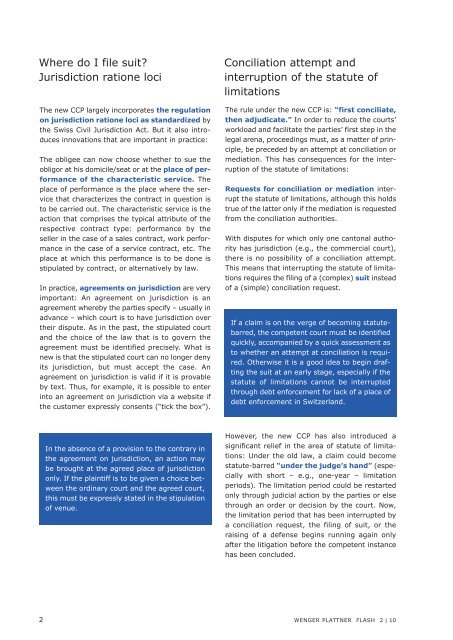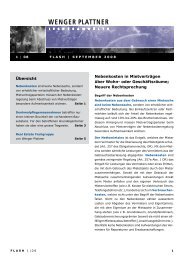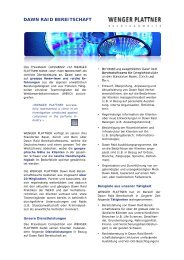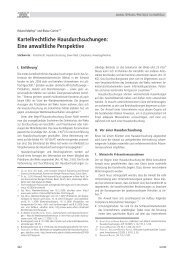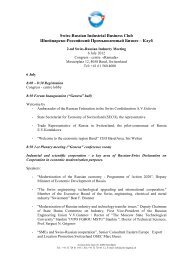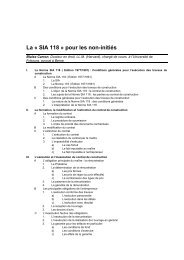New Swiss Code of Civil Procedure - Wenger Plattner
New Swiss Code of Civil Procedure - Wenger Plattner
New Swiss Code of Civil Procedure - Wenger Plattner
Create successful ePaper yourself
Turn your PDF publications into a flip-book with our unique Google optimized e-Paper software.
Where do I file suit?<br />
Jurisdiction ratione loci<br />
The new CCP largely incorporates the regulation<br />
on jurisdiction ratione loci as standardized by<br />
the <strong>Swiss</strong> <strong>Civil</strong> Jurisdiction Act. But it also introduces<br />
innovations that are important in practice:<br />
The obligee can now choose whether to sue the<br />
obligor at his domicile/seat or at the place <strong>of</strong> performance<br />
<strong>of</strong> the characteristic service. The<br />
place <strong>of</strong> performance is the place where the service<br />
that characterizes the contract in question is<br />
to be carried out. The characteristic service is the<br />
action that comprises the typical attribute <strong>of</strong> the<br />
respective contract type: performance by the<br />
seller in the case <strong>of</strong> a sales contract, work performance<br />
in the case <strong>of</strong> a service contract, etc. The<br />
place at which this performance is to be done is<br />
stipulated by contract, or alternatively by law.<br />
In practice, agreements on jurisdiction are very<br />
important: An agreement on jurisdiction is an<br />
agreement whereby the parties specify – usually in<br />
advance – which court is to have jurisdiction over<br />
their dispute. As in the past, the stipulated court<br />
and the choice <strong>of</strong> the law that is to govern the<br />
agreement must be identified precisely. What is<br />
new is that the stipulated court can no longer deny<br />
its jurisdiction, but must accept the case. An<br />
agreement on jurisdiction is valid if it is provable<br />
by text. Thus, for example, it is possible to enter<br />
into an agreement on jurisdiction via a website if<br />
the customer expressly consents (“tick the box”).<br />
Conciliation attempt and<br />
interruption <strong>of</strong> the statute <strong>of</strong><br />
limitations<br />
The rule under the new CCP is: “first conciliate,<br />
then adjudicate.” In order to reduce the courts’<br />
workload and facilitate the parties’ first step in the<br />
legal arena, proceedings must, as a matter <strong>of</strong> principle,<br />
be preceded by an attempt at conciliation or<br />
mediation. This has consequences for the interruption<br />
<strong>of</strong> the statute <strong>of</strong> limitations:<br />
Requests for conciliation or mediation interrupt<br />
the statute <strong>of</strong> limitations, although this holds<br />
true <strong>of</strong> the latter only if the mediation is requested<br />
from the conciliation authorities.<br />
With disputes for which only one cantonal authority<br />
has jurisdiction (e.g., the commercial court),<br />
there is no possibility <strong>of</strong> a conciliation attempt.<br />
This means that interrupting the statute <strong>of</strong> limitations<br />
requires the filing <strong>of</strong> a (complex) suit instead<br />
<strong>of</strong> a (simple) conciliation request.<br />
If a claim is on the verge <strong>of</strong> becoming statutebarred,<br />
the competent court must be identified<br />
quickly, accompanied by a quick assessment as<br />
to whether an attempt at conciliation is required.<br />
Otherwise it is a good idea to begin drafting<br />
the suit at an early stage, especially if the<br />
statute <strong>of</strong> limitations cannot be interrupted<br />
through debt enforcement for lack <strong>of</strong> a place <strong>of</strong><br />
debt enforcement in Switzerland.<br />
In the absence <strong>of</strong> a provision to the contrary in<br />
the agreement on jurisdiction, an action may<br />
be brought at the agreed place <strong>of</strong> jurisdiction<br />
only. If the plaintiff is to be given a choice between<br />
the ordinary court and the agreed court,<br />
this must be expressly stated in the stipulation<br />
<strong>of</strong> venue.<br />
However, the new CCP has also introduced a<br />
significant relief in the area <strong>of</strong> statute <strong>of</strong> limitations:<br />
Under the old law, a claim could become<br />
statute-barred “under the judge’s hand” (especially<br />
with short – e.g., one-year – limitation<br />
periods). The limitation period could be restarted<br />
only through judicial action by the parties or else<br />
through an order or decision by the court. Now,<br />
the limitation period that has been interrupted by<br />
a conciliation request, the filing <strong>of</strong> suit, or the<br />
raising <strong>of</strong> a defense begins running again only<br />
after the litigation before the competent instance<br />
has been concluded.<br />
2 WENGER PLATTNER FLASH 2 | 10


